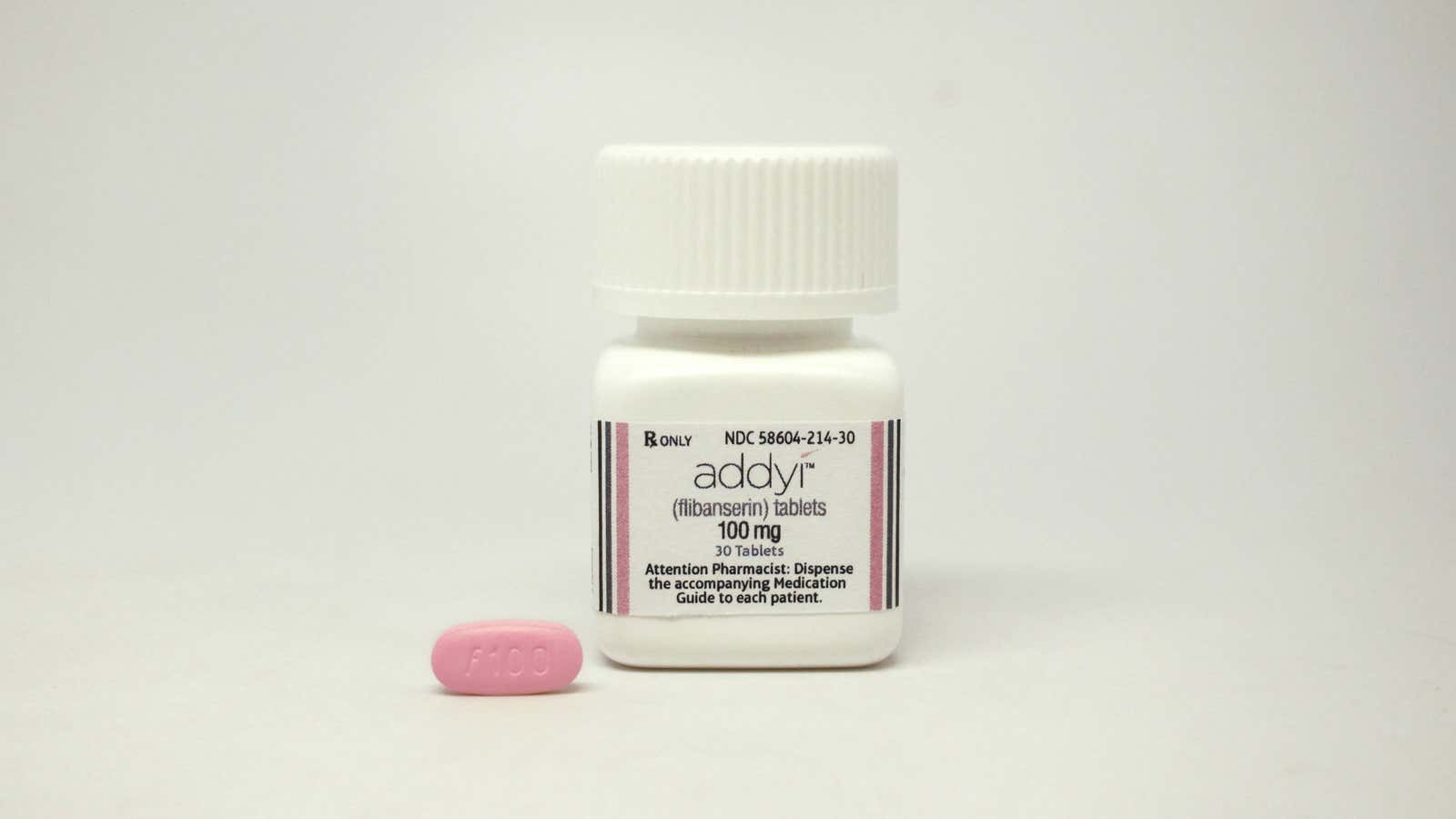The very first FDA-approved drug for female sexual dysfunction is available in the United States today (Oct. 17), marking a much-anticipated milestone for women who struggle with sexual desire. Sprout, the pharmaceutical company behind the drug, has spent $50m to develop the treatment. But female sexual desire is biologically complex, and this drug won’t work like similar products for men. Here are the key details:
Who is it for?
Some 40% of women in America suffer from female sexual dysfunction, according to the National Institute of Health, but this drug is for the roughly 10% of premenopausal women who suffer from hypoactive sexual desire disorder (HSDD). This condition is defined as a persistent absence of sexual thoughts and interest in sexual activity, which causes distress and cannot be explained by another medical condition or substance.
How does it work?
The drug, which is called flibanserin but will be sold under the brand name Addyi, has been called the “female Viagra” but will not be a quick fix in the way that the little blue pill affects men.
Addyi affects chemicals in the brain, and it’s not exactly clear why it causes increased sexual desire. The pill increases levels of dopamine, a chemical linked to appetite, and lowers serotonin, which is linked to mood and feelings of satisfaction.
Women have to take the pill once a day at bedtime. It will take four weeks before they notice a change and eight weeks to feel the full effect.
What are the effects?
Addyi is far from a miracle pill, and the effects have been described as “modest.” In clinical trials, women reported an increase of up to one additional satisfying sexual event per month, according to FDA reports, while between 8% and 13% of women reported feeling “much improved” sexual desire.
But individuals involved in the trials have said that Addyi improved their lives. Amanda Parris, 52, said she lost sexual interest three years into her marriage and nothing helped until she was enrolled in the Addyi trial. “For us, flibanserin is a relationship-saving, life-changing drug,” she told the review panel for Addyi.
What are the risks?
Addyi can cause extremely low blood pressure and loss of consciousness and these risks are far more severe when combined with alcohol – which means that women taking the drug will not be allowed to drink. “They can’t even have a social glass of wine,” OB/GYN Ava Mahapatra told Desert Sun.
One in five women involved in the trial reported feeling extreme fatigue, and the drug can also cause light-headedness and nausea.
The Addyi medication guide notes that women with liver problems or taking certain medications should not take the drug. Addyi should also not be mixed with certain herbal supplements, including St. John’s Wort and ginkgo, as well as grapefruit juice. “Drinking grapefruit juice during your treatment with ADDYI increases your risk of severe low blood pressure and fainting,” reports the medication guide.
How much will it cost?
The market for female sexual dysfunction drugs is estimated to be worth $2bn per year, and Sprout the pharmaceutical company plans to make the drug affordable.
Sprout will offer a plan that gives women Addyi for $20 per month, provided their health insurance covers the drug. If they’re not covered, Sprout is offering the drug for $20 per month for three months, according to the Business Journals.
Ram Upadhyayula, the head pharmacist at Desert Hospital Outpatient Pharmacy, told Desert Sun that Addyi was listed as costing $40 per pill.
How do you get it?
Addyi will only be available through certified pharmacies and health care professions. Doctors will also talk to patients in detail before prescribing the drug, and should ask them about their birth control, medication, relationship with their partner, and whether they’ve had depression or other mental health problems.
Women may have low sexual desire for many reasons, including tensions in their relationship or depression, and so Addyi won’t work for everyone. But though Addyi’s effectiveness may be limited, it’s thought that the pill will open the door for other female sexual dysfunction drugs to enter the market.
